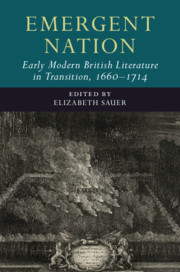47 results
Part II - Ideological Transitions
-
- Book:
- Emergent Nation: Early Modern British Literature in Transition, 1660–1714
- Published online:
- 08 February 2019
- Print publication:
- 21 February 2019, pp 107-202
-
- Chapter
- Export citation
Contributors
-
- Book:
- Emergent Nation: Early Modern British Literature in Transition, 1660–1714
- Published online:
- 08 February 2019
- Print publication:
- 21 February 2019, pp x-xvi
-
- Chapter
- Export citation
Copyright page
-
- Book:
- Emergent Nation: Early Modern British Literature in Transition, 1660–1714
- Published online:
- 08 February 2019
- Print publication:
- 21 February 2019, pp iv-iv
-
- Chapter
- Export citation
Introduction
-
-
- Book:
- Emergent Nation: Early Modern British Literature in Transition, 1660–1714
- Published online:
- 08 February 2019
- Print publication:
- 21 February 2019, pp 1-18
-
- Chapter
- Export citation
Part III - Cultural Transitions
-
- Book:
- Emergent Nation: Early Modern British Literature in Transition, 1660–1714
- Published online:
- 08 February 2019
- Print publication:
- 21 February 2019, pp 203-292
-
- Chapter
- Export citation
Illustrations
-
- Book:
- Emergent Nation: Early Modern British Literature in Transition, 1660–1714
- Published online:
- 08 February 2019
- Print publication:
- 21 February 2019, pp viii-ix
-
- Chapter
- Export citation
Part IV - Local Transitions
-
- Book:
- Emergent Nation: Early Modern British Literature in Transition, 1660–1714
- Published online:
- 08 February 2019
- Print publication:
- 21 February 2019, pp 293-389
-
- Chapter
- Export citation
Chapter 7 - The Dissidence of Dissent in Late Seventeenth-Century English Literature
- from Part II - Ideological Transitions
-
-
- Book:
- Emergent Nation: Early Modern British Literature in Transition, 1660–1714
- Published online:
- 08 February 2019
- Print publication:
- 21 February 2019, pp 128-146
-
- Chapter
- Export citation
Contents
-
- Book:
- Emergent Nation: Early Modern British Literature in Transition, 1660–1714
- Published online:
- 08 February 2019
- Print publication:
- 21 February 2019, pp v-vii
-
- Chapter
- Export citation
Index
-
- Book:
- Emergent Nation: Early Modern British Literature in Transition, 1660–1714
- Published online:
- 08 February 2019
- Print publication:
- 21 February 2019, pp 390-402
-
- Chapter
- Export citation
Part I - Generic Transitions
-
- Book:
- Emergent Nation: Early Modern British Literature in Transition, 1660–1714
- Published online:
- 08 February 2019
- Print publication:
- 21 February 2019, pp 19-106
-
- Chapter
- Export citation

Emergent Nation: Early Modern British Literature in Transition, 1660–1714
-
- Published online:
- 08 February 2019
- Print publication:
- 21 February 2019
John Milton. Prose: Major Writings on Liberty, Politics, Religion, and Education. Ed. David Loewenstein. Chichester: Wiley-Blackwell, 2013. xxviii + 578 pp. $32.95. ISBN: 978-1-4051-2931-2.
-
- Journal:
- Renaissance Quarterly / Volume 67 / Issue 2 / Summer 2014
- Published online by Cambridge University Press:
- 20 November 2018, pp. 636-637
- Print publication:
- Summer 2014
-
- Article
- Export citation
Andy Kesson and Emma Smith, eds. The Elizabethan Top Ten: Defining Print Popularity in Early Modern England. Material Readings in Early Modern Culture series. Farnham, UK: Ashgate, 2013. Pp. 284. $119.95 (cloth).
-
- Journal:
- Journal of British Studies / Volume 53 / Issue 3 / July 2014
- Published online by Cambridge University Press:
- 26 August 2014, pp. 769-771
- Print publication:
- July 2014
-
- Article
- Export citation
Index
-
- Book:
- Milton, Toleration, and Nationhood
- Published online:
- 05 December 2013
- Print publication:
- 09 December 2013, pp 213-223
-
- Chapter
- Export citation
Acknowledgments
-
- Book:
- Milton, Toleration, and Nationhood
- Published online:
- 05 December 2013
- Print publication:
- 09 December 2013, pp vii-viii
-
- Chapter
- Export citation
Note on Editions
-
- Book:
- Milton, Toleration, and Nationhood
- Published online:
- 05 December 2013
- Print publication:
- 09 December 2013, pp ix-x
-
- Chapter
- Export citation
Introduction
-
- Book:
- Milton, Toleration, and Nationhood
- Published online:
- 05 December 2013
- Print publication:
- 09 December 2013, pp 1-21
-
- Chapter
- Export citation
Chapter 6 - Exogamy: “Entercourse” with Philistines
-
- Book:
- Milton, Toleration, and Nationhood
- Published online:
- 05 December 2013
- Print publication:
- 09 December 2013, pp 136-158
-
- Chapter
- Export citation
Contents
-
- Book:
- Milton, Toleration, and Nationhood
- Published online:
- 05 December 2013
- Print publication:
- 09 December 2013, pp v-vi
-
- Chapter
- Export citation



